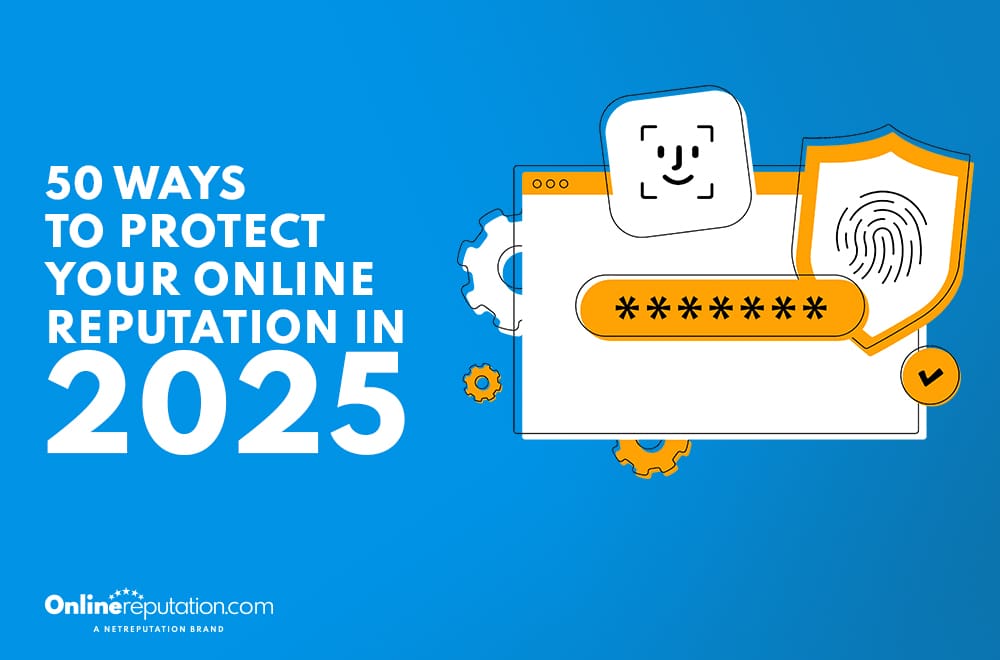
When you remove arrest records from the internet, you gain control over your online reputation. Read on to learn more.
We’ve all made mistakes in our lives. If those mistakes include an embarrassing arrest, chances are your arrest record is available online for anyone to find. When these criminal records appear in search engine results, your online reputation may be at risk.
What if a potential employer, a new relationship interest, or a prospective business partner were to find your mugshot or arrest record in search results? Negative information, including negative news articles or a criminal record, can stand in the way of you achieving your personal and professional goals.
In this guide, we’ll explore the best ways to remove a criminal record from the internet. We’ll also explain why this process is so critical for protecting or restoring your digital footprint.
You can create a robust and positive online reputation even if you’re starting from zero or coming back from a PR crisis. Call us at 844-230-3803 for more information about online reputation management.
Criminal Records and Public Records Laws

Most states have some form of public records law that requires government agencies to make records available online. Based on passed legislation, a government agency will post records to a publicly available database. Through these databases, anyone with an internet connection may search by name or address to find a person’s mugshot or criminal record.
Public records on these databases may include:
- Arrest records, including for minor offenses
- Court documents
- Marriage licenses
- Mugshots
- Property records
- Public court records
- Other types of harmful online content
These public records may or may not appear in Google search results but can be accessed online with just a few clicks of a mouse by visiting the county clerk or a similar agency website.
Public court records available for anyone to see can be embarrassing. Worse, they can compromise your online reputation, making it harder for you to land a new job, get accepted into the school of your choice, get a loan, or enter into a new relationship with someone you met online or in person.
At OnlineReputation, we work with clients to build their online reputation and take control of their digital presence. Give us a call at 844-230-3803 to learn more.
How Did My Arrest Record or Criminal Record Get Online?

Have you ever searched for your name in Google or on one of the other popular search engines? If you have, you may be surprised — even alarmed — at what information appears in search results. How did your information and images get on the web in the first place? There are three primary sources for public records.
1. Public Records Databases
Court records — including arrest reports, criminal records, and mugshots — are posted by government agencies based on a legal obligation by these agencies to make records available to the public. In essence, any time you deal with a government agency, official records of that interaction may become part of the public record. Typically, records collected by federal, state or local agencies are done so to comply with the Freedom of Information Act.
2. People Search Sites
Once public court records and other information are posted to the web by government agencies, they have a tendency to spread quickly. The culprits in this viral spread of sensitive information are people-search websites, sometimes called data brokers. Data brokers use automated tools to scrape publicly available records from government databases, and then they republish this information on their own websites.
There are literally hundreds of these third-party sites. While they can be useful for locating information about someone you met in person or online, they can also damage your reputation by posting sensitive information about you.
3. Mugshot Sites
Mugshot sites operate in a similar way to people-search sites. However, the information these sites post is specifically related to arrests and criminal activity. The public information posted on a mugshot site may include your criminal record, court records, or online arrest records, which is typically the same data that’s found on government databases.
Mugshot websites have become incredibly popular. Many of them got their start by posting celebrity mugshots, then expanded their offerings to include criminal charges of every average person who has been arrested or detained by law enforcement officials. Some post just mugshots, while others include a person’s criminal history, arrest and court records, or personal information. If one site gets your booking photos, they may suddenly appear on multiple websites.
These sites get so much traffic every day that your mugshot or arrest details may appear at the top of search engine results for your name. Imagine if a prospective employer or loan officer were to stumble across these embarrassing records.
Your online reputation is more important than ever before. Get started with a free analysis here or explore our services here.
Are These Websites Legal?

Now that you’ve learned how your records find their way into the digital environment, you may wonder, “How are these mugshot sites and data brokers even legal?”
The answer, unfortunately, is complicated. Many websites and private databases operate under the guise of First Amendment protections, claiming they only share public records that were originally published online by government agencies.
It is important to note that data broker sites are only legal if they do not sell access to your public records. If they attempt to charge a fee for access or for a removal service, they may be in violation of multiple state and federal laws.
People-search and mugshots sites get a lot of web traffic, and the business model for many of these sites is to sell advertising. In a very broad sense, these sites make money by capitalizing on your embarrassing records and past mistakes.
Court Records Can Compromise Your Personal Privacy and Online Reputation

Every day, people turn to search engine giant Google to conduct informal background searches on others. These searches are conducted to learn basic details about someone, often before making hiring or loan decisions.
If you’ve ever applied for a job, school enrollment, or a loan, chances are people have used online searches to learn about you.
Also consider this: 50% of all daters who use online dating apps or sites search for someone they meet online. Moreover, 30% of people who use online dating services and Google someone they meet online either find something objectionable or find nothing at all and opt not to meet up in person.
The truth is evident: If the information found in search results is negative, your online reputation can be damaged, potentially keeping you from achieving your goals.
Other types of personal information that appear in Google search results can also put your privacy at risk. Cybercriminals commonly use public records databases, people search sites, and Google searches to gain access to your personal details. Once they have your details, they can commit identity theft, which may result in:
- Fraudulent bank accounts opened in your name
- Falsified tax returns
- Fraudulent credit or home loan applications made in your name
- Impersonation of you to gain even more access to your records
Phishing, personal data breaches, extortion and identity theft fall within the top eight types of internet crimes reported. That means that not only your reputation but also your bank account and good credit rating are at risk when public records fall into the hands of criminals.
Removing Arrest and Court Records From the Web

Getting your records removed from the internet can be a challenge, especially if those records have appeared on multiple sites or databases. There are a few ways you can approach this task. Note that you may need a combination of approaches to remove criminal records from appearing online.
1. Government Agency Requests
As mentioned, getting your mugshot removed from the internet or removing court records can be a challenge. Typically, government agencies are required by law to make records available and will only remove public records or similar data if they are legally required to. Often, this means getting a court order from a judge, such as when charges were dropped or your records were expunged. Every state has different laws regarding record removal, so you’ll need to speak to your court’s clerk to find out your options.
2. Website Removal Requests
Third-party data brokers and people search sites often give people the option to have their records removed. Or, at the very least, you’ll be able to update outdated or incorrect information that could be harming your reputation.
Unfortunately, online content removal can be a multi-step process:
- First, locate the contact information for the website’s owner. If the site in question doesn’t post this information, you can conduct a WHOIS lookup to find phone numbers and email addresses for each site.
- Next, make a request to remove your personal details from the site. You may have to provide a compelling reason for removal, such as a court order or other legal request.
Depending on the particular situation, records may also be removed if they reveal trade secrets or other sensitive information that puts you or your company at risk.
Making a removal request does not always work, but this is a valid solution to try as you work to get your records off the web for good.
3. Data Broker Opt-Outs
You can prevent data brokers from sharing your personal details once and for all by completing an opt-out request. Most sites have some form of an opt-out process. Simply follow the directions on each website until your records are no longer visible in search results.
Generally speaking, it may take several days or weeks for information to be removed after an opt-out request is made. Many websites update their records on a schedule, so check back periodically until you see they’ve been taken down.
4. Legal Action
If you have faced difficulty in getting your mugshot or other records removed from publicly accessible databases, experienced legal professionals can help. Attorneys familiar with records laws often have several strategies they can employ, including:
- Digital Millenium Copyright Act (DMCA) takedown notices
- Legal order based on state expungement law if you have been found not guilty of a crime committed or if your charges were dropped
- Website Terms of Service (ToS) violations
- Legally compelling reasons why your personal information must be removed to protect your privacy and safety
Many attorneys offer a free consultation, helping you to understand the process behind legal removal requests. The attorney-client relationship is a valuable tool to have as you work to restore or preserve your internet reputation and remove criminal records.
5. Content Suppression Services
The strategies listed above may be more work than you’re able or willing to do. Or, you may not have had any luck with criminal record removal even after following those suggestions. In this case, search engine suppression might be your best option.
Suppression strategies push negative news articles, mugshots and other harmful content off the first page of internet search results. This strategy combines search engine optimization (SEO) and content development tactics to flood search engines with new information, thereby helping you to control the online narrative.
Why does this work? Because most users don’t go past the first search engine results page (SERP). Less than 1% click on a result on the 2nd page, according to Backlinko.
Also note that your ORM team can submit takedown requests and fill out removal forms on your behalf. As mentioned earlier, you may need a combination of strategies to remove criminal records from search results.
Contact OnlineReputation Today

Reputation management is a valuable strategy for improving your digital footprint. ORM professionals can help you remove mugshots, arrest reports, or other negative content that’s damaging to your online presence.
At OnlineReputation.com, we provide must-know information to individuals and businesses who want to create, grow or repair their digital reputation. Whether you’re prioritizing your personal or professional online reputation, our advice and team of experts can help.
Ready to remove court records, mugshots, or other embarrassing details from the internet? Contact our team today at 844-230-3803 for a free consultation.
Last updated 12/2025
You might also like
5 Important Online Reputation Management Tips for Creating Content in 2026
When you remove arrest records from the internet, you gain control over your online reputation. Read on to learn more. …

